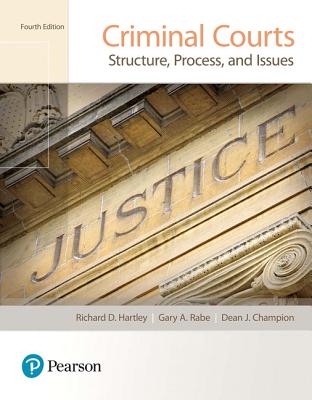A comprehensive examination of the criminal court system and the processing of defendants
From the actors in the system, including judges, prosecutors, and defense attorneys, through the sentencing and appeals process, Criminal Courts provides comprehensive coverage of the United States Criminal Court systems in a succinct, readable approach. It examines issues confronting the system from historical, philosophical, sociological, and psychological perspectives, and throughout there are comparisons of court ideals with what actually happens in the courts. Comprehensive coverage of the processing of offenders from when they are arrested and charged with crimes, to when they are convicted and sentenced is presented, and throughout the text, practical, real-life applications of the topics and issues give the material meaning. Included to enhance learning are: evidence-based chapter openings that provide context to the chapter’s material, boxes that discuss relevant case law, chapter summaries to reiterate the chapter learning objectives, and policy-oriented critical thinking exercises based on current issues facing the system.
For courses in Criminal Courts, Court Process and Sentencing, and Courts and Sentencing Issues
A comprehensive examination of the criminal court system and the processing of defendants
From the actors in the system, including judges, prosecutors, and defense attorneys, through the sentencing and appeals process, Criminal Courts provides comprehensive coverage of the United States Criminal Court systems in a succinct, readable approach. It examines issues confronting the system from historical, philosophical, sociological, and psychological perspectives, and throughout there are comparisons of court ideals with what actually happens in the courts. Comprehensive coverage of the processing of offenders from when they are arrested and charged with crimes, to when they are convicted and sentenced is presented, and throughout the text, practical, real-life applications of the topics and issues give the material meaning. Included to enhance learning are: evidence-based chapter openings that provide context to the chapter’s material, boxes that discuss relevant case law, chapter summaries to reiterate the chapter learning objectives, and policy-oriented critical thinking exercises based on current issues facing the system.
Get Criminal Courts by at the best price and quality guranteed only at Werezi Africa largest book ecommerce store. The book was published by Pearson Education (US) and it has pages. Enjoy Shopping Best Offers & Deals on books Online from Werezi - Receive at your doorstep - Fast Delivery - Secure mode of Payment
 Jacket, Women
Jacket, Women
 Woolend Jacket
Woolend Jacket
 Western denim
Western denim
 Mini Dresss
Mini Dresss
 Jacket, Women
Jacket, Women
 Woolend Jacket
Woolend Jacket
 Western denim
Western denim
 Mini Dresss
Mini Dresss
 Jacket, Women
Jacket, Women
 Woolend Jacket
Woolend Jacket
 Western denim
Western denim
 Mini Dresss
Mini Dresss
 Jacket, Women
Jacket, Women
 Woolend Jacket
Woolend Jacket
 Western denim
Western denim
 Mini Dresss
Mini Dresss
 Jacket, Women
Jacket, Women
 Woolend Jacket
Woolend Jacket
 Western denim
Western denim
 Mini Dresss
Mini Dresss






























































